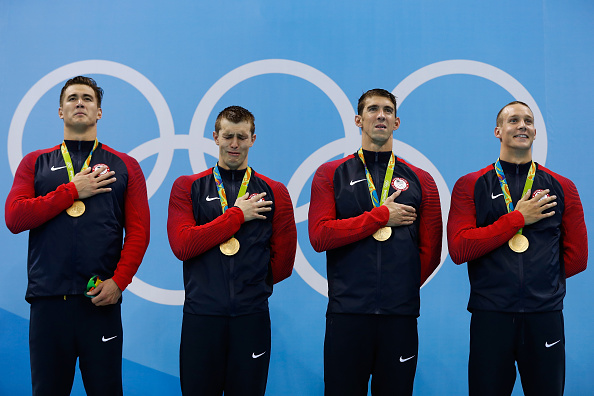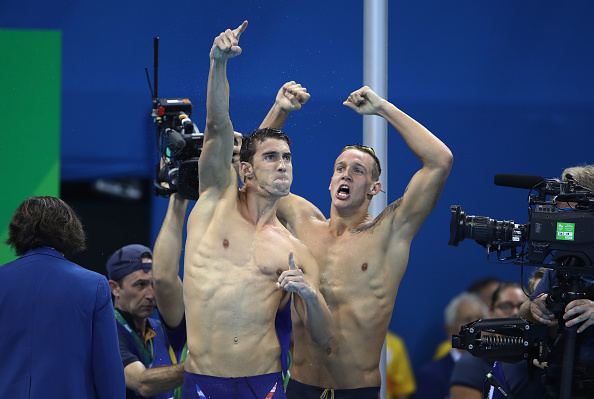BARCELONA -- With Michael Phelps watching from the stands, the U.S. men took a lead into the final leg of the men's 4x100 relay here Sunday night at the Palau Sant Jordi.
As the old building roared, what happened in the next 48 or so seconds was either a bad case of déjà two all over again or a matter of the Americans playing not for short-term glory but for long-term reward. Depends on your point of view.
Just like last year at the Olympic Games in London, the French ran the Americans down in the final 50 meters. Last year it was Yannick Agnel showing Ryan Lochte no mercy. This time, Jeremy Stravius showed Jimmy Feigen how it's done, the French winning in 3:11.18, the Americans 24-hundredths back.
Russia took third, another 20-hundredths behind. Vlad Morozov ripped off a 47.4 third leg but it was not enough.

"We wanted to win. What can I say?" Agnel -- who has been training in Baltimore this year with Phelps' longtime mentor, Bob Bowman -- said afterward.
Bowman, who is the U.S. men's coach here, said, "We could definitely do better. We are disappointed with that."
You think the U.S. men could have used, well, Phelps?
"Those four guys did an amazing job," Natalie Coughlin, the veteran U.S. racer said after the American women's 4x100 relay team won gold, buoyed by Megan Romano's thrilling anchor leg. Coughlin quickly added in a reference to the U.S. team overall but one that served as a punctuation to the men's relay, "Yeah, we miss Michael."
That's because Michael -- who was quite the presence Sunday in Barcelona, signing autographs, posing for photos, doing his thing as swim ambassador, his right foot in a walking boot -- understood fully that the 4x100 free relay traditionally has been an American priority, whether at the worlds and the Olympics, and that winning it is technically fairly simple to diagram if nonetheless difficult to execute.
The men's freestyle relay now has evolved to the point that it takes all four guys swimming in the 47-second range. If one guy rips off 46-something, all kinds of things are possible.
This is what Jason Lezak showed in Beijing in 2008 with his out-of-this-world 46.06 anchor leg, after Phelps himself opened up with a 47.51. Garrett Weber-Gale, swimming second, went 47.02; Cullen Jones, third, 47.65. The Americans won by eight-hundredths of a second over the French.
In 2009, at the world championships in Rome, Phelps led off in 47.78. Lochte went next, in 47.03. Matt Grevers followed in 47.61. Nathan Adrian closed in 46.79. The Americans won.
In 2011, at the worlds in Shanghai, Phelps led off -- in 48.08. Weber-Gale went next, in 48.33. Lezak went third, going 48.15. Adrian swam 47.64. The Americans took third, in 3:11.96. The Aussies put together four 47s, and won in 3:11 flat.
Last year at the Olympics, Adrian kicked things off in 47.89. Phelps went next, in 47.15. Jones, back in form, turned in a 47.6. Then Lochte went 47.74. Should have been good enough, right?
Except that Agnel went 46.74.
The French won in 3:09.93, the Americans taking silver in 3:10.38. Just like this year, the Russians took third.
The American line-up Sunday night was Adrian, Lochte, Anthony Ervin and Feigen.
Feigen swam in the prelims in the 4x100 relay in London, going 48.49. He also has pulled recent national-team duty at the world short-course championships -- that is, in a 25-meter pool -- with comparatively few fans in the stand.
This would be his first turn on the big stage.
In Sunday's prelims, Ervin went 47.38. Ricky Berens, a national-team veteran, rocked a 47.56. Like Feigen, Berens swam in the London prelims. Berens is a two-time gold medalist in the 4x200 relay.
Bowman and the other U.S. coaches opted to go with Feigen and, moreover, to put him in the anchor slot.
The French countered with Agnel, Florent Manaudou, Fabien Gilot and Stravius.
Manaudou won gold in the 50 free in London, in 21.34. Gilot went 47.67 in the London relay win. Stravius was the unknown -- having gone 48.32 in the London relay prelims. At a news conference a couple days ago, he had said he was "happy to be here."
Agnel turned in -- by his measure -- a sub-par 48.76; after his swim the French were seventh. Manaudou went 47.93, lifting them back up to fourth. Then Gilot ripped off a 46.9.
Meanwhile, Adrian went 47.95, Lochte 47.8, Ervin 47.44. It seemed the Americans were heading toward victory.
Stravius, though, went 47.59.
Feigen? 48.23.
Three Americans went 47, one went 48.23 and the U.S. lost by 24-hundredths. There, essentially, is your race.
To his credit, Feigen -- who absolutely is an up-and-comer -- was straight-up about it all afterward. He said Stravius "ended up wanting it more than I did, and that showed." He said, "I've got to learn to swim my own race," acknowledging his breathing pattern was slightly off as he came toward the final wall.
"You know what?" said Ervin, the 2000 Sydney Games 50 free gold medalist who is now 32 and has since seen a lot of life. "You can't win them all. When you can't win, what you get is experience."
"It's kind of a learning experience," Feigen said. "And hopefully, I can get better every time."
Which, Bowman said, is the point. If you're not going to win, there's Rio and 2016 to consider.
Asked if the Americans were missing Phelps Sunday night, he laughed and said, "We were on that relay, I think.
"You know, it's the way it goes. These guys are learning. We are trying to figure out where people should go, really, in 2016. We want to win all these. But, these guys, it's the first time in a new [quadrennium]. Everybody gets kind of a shot to see where they are."
Asked if the French were glad Phelps wasn't swimming, Agnel said, "I don't understand the question." Which he totally did, because he then smiled a very big smile.
Bowman added that Phelps had been texting critiques of the race from his perch in the stands.
"He was disappointed we got beat," Bowman said, adding a moment later, "He was just giving me his analysis of the race, things I could have done better." Which was? Another laugh. "I'll keep that to myself."





